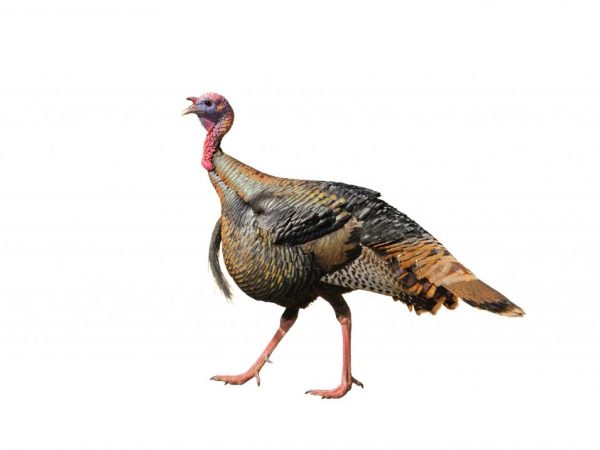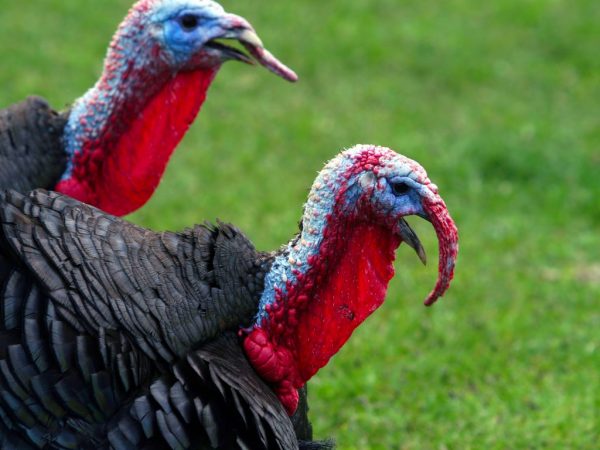Causes of sinusitis in turkeys
Sinusitis in turkeys is a fairly well-known disease today, which is very common in such a bird. In order to properly treat infectious sinusitis in turkeys, you need to know all its symptoms. In the event that you identify the symptoms of this disease in time, then you will be able not only to save all the number of birds, but also your material well-being. So, if sinusitis occurs in your turkeys, treatment is urgent.

Causes of sinusitis in turkeys
What are the causes of this disease?
Considering in turkeys such a disease as sinusitis, it is worth paying attention to the fact that it is infectious in nature and is a serious respiratory type disease, expressed in both chronic and acute forms. This disease has its own pathogen, which constantly spreads and thereby affects the sinuses and respiratory tract in turkeys. Due to this effect, turkeys completely lose their appetite, they seriously lose weight, and become tired.
As for the modes of transmission, infectious sinusitis is transmitted in turkeys from infected individuals or through infected eggs. In addition, it should be understood that the infection of this disease can spread through liquid or through the air. Very often, the presence of sinusitis in turkeys comes from contaminated personnel or equipment through which the animal is being looked after. If we consider the spread of this disease among turkeys, then there may be a tendency that this process occurs very quickly.
In the event that the symptoms of this disease were found in one bird, then each farmer must immediately inspect the entire livestock and take the necessary preventive measures. In this case, the infection may not appear immediately, since the incubation period is 1-3 weeks. If the care of the bird is correct, then infectious sinusitis will not manifest itself for a long time in this animal, and if detected early, the treatment will be quite fast.
What are the symptoms of this disease?
If we consider the treatment of such a disease, then first of all it is worth paying attention to the symptoms and its forms of course. Sinusitis in turkeys can manifest in the following forms:
- chronic form;
- acute form.
In the presence of an acute form of a similar disease, the bird has symptoms of the disease, manifested in the form of:
- mucus is actively secreted from the nasal passage of turkeys;
- severe swelling of the larynx;
- excessively difficult nasal breathing;
- the presence of wheezing that can be heard when listening.
If sinusitis has been found in turkeys, then the development and growth of the chick is significantly slowed down. In addition, a similar disease in turkeys and adults significantly lowers immunity, which leads to the fact that birds become vulnerable to other respiratory and infectious diseases.

Treatment is always needed
When observing a chronic form, turkeys may experience symptoms such as a sharp weight loss, productivity will become almost zero, if this disease progresses altogether, then turkey poults will not gain weight at all.
If the bird is not treated, then it will carry a small number of eggs or will stop carrying them altogether. However, remember that such eggs cannot be used, as they are already infected. If a fairly young turkey fell ill, then in most cases he dies altogether.
How to treat and diagnose sinusitis
If your chicks have sinusitis, you should know exactly how to treat it. In the event that you wish to have turkey poultry and adults to diagnose a similar ailment, then you need to monitor the general symptoms as closely as possible and conduct a special laboratory study. Due to the fact that it is quite difficult and long to identify the pathogen, for this you should contact a trusted laboratory, which will make a high-quality diagnosis and identify the causative agent of such an ailment.
At the same time, the process of treating turkeys for sinusitis implies the mandatory use of antibiotics, since it is completely impossible to get rid of the infection by other means. It often happens that farmers do not provide a full-fledged treatment, but simply eliminate the initial symptoms. Because of this, their livestock simply suffers and a real epidemic arises. In addition, you should know that the process of treating turkey sinusitis with conventional folk remedies will not be effective at all. As for the choice of antibiotics that will get rid of turkey sinusitis, in most cases these include antibiotics of the so-called tetracycline group. Therefore, you can safely treat turkey poults:
- tetracycline;
- furazolidone;
- tetramycin;
- typhosine;
- erythromycin;
- phraseidin.
Very often, treatment by farmers of turkey poults and adults is carried out with an injection form of tylosin and tartratam. How to treat sinusitis in turkey poults with similar drugs, for this there are detailed instructions for their use. Most often, in the first stages, only one injection is enough for the bird, after which a 30-day break should be made. If you notice that the treatment does not give the desired result, then it is advisable not to prolong this process and send the bird to slaughter. Most often, even after using such medicines, the ailment comes back. You can also try mixing the antibiotic into the water that the bird drinks. Also, pay attention to the fact that the meat is not contaminated with an antibiotic, about two days before the intended slaughter, it is necessary to stop giving it.
As a control, it is advisable to kill the cured bird immediately after healing. In the event that you notice an infection among adult birds that will be parents, then it is recommended to destroy all eggs in the incubator, and first cure the parents so that they cannot infect other birds and immediately send them to slaughter.
Preventive measures
Every farmer considering how to treat sinusitis in turkeys should know that the bacterium that acts as a pathogen is quite unstable in the external environment. As for its survival outside the body, this process does not last long. But if the temperature is high enough or, on the contrary, very low, then in such situations it can persist for a long period. Even in the feces of this bird, the bacterium lives for three days.
First of all, do not forget about preventive measures. In the event that turkey poultry sinusitis has been detected by you, you must first quarantine the farm immediately. Its introduction means cleaning and disinfection of the room in which the bird was located.As soon as you carry out such measures, you should immediately turn to laboratory tests that will help to exclude or confirm the causative agent of this disease. If you were going to introduce new representatives, then this can be done only 14 days after disinfection.
To date, in order to treat this ailment, there is no special vaccine. But since all kinds of research are carried out systematically, it is possible that a similar vaccine will appear soon. Therefore, at this stage, it is only possible to carry out systematic disinfection, examination of the bird, carry out the process of treatment with antibiotics and isolate already sick individuals from healthy livestock.


